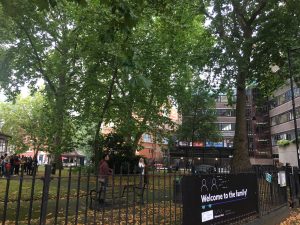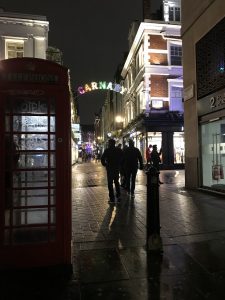When you are a student, something always comes up. The luxury of knowing what will happen to you after a week is already something difficult to achieve. As a first-year journalism student, I have to always be active, going and exploring. Because I want to know more, and City, University of London always encourages its students to be curious. I am excited about the following five journalistic questions: What? Who? Where? When? Why? My job is to reveal them. Turn them into text and picture. To turn the truth into creativity!
My university schedule and assignments:
My typical week consists of four days at university and three days for story and memory making. However, percentage-wise I have 28% scheduled learning and 72% independent learning. My modules include digital, audio and video journalism and thorough coverage of basic principles of journalism, the history of journalism and politics and current affairs. We were also given the chance to learn another language, in my case – Spanish!
Personally, the best advantage so far is that I do not have to spend my free time working on assignments I am not interested in. In fact, our tutors give us the opportunity to write about topics we have chosen and I am fortunate enough to simultaneously learn essential journalistic skills and gain a better understanding of topics I am passionate about. At times contacting interviewees, researching, filming, editing and working on two or three projects at once can be nerve-racking. Especially if things do not work out the way you have imagined them to be. However, finally being able to see or hear the fruit of your labour is the most rewarding feeling I have ever experienced!
When it comes to entertainment and meeting up with new people:
City hosts a wide range of events, which cover not only political topics but also music-related events and panels with topical issues such as “Respect at work: how to command it and when to demand it”. I enjoy participating because we should always strive to learn more, but also – this is an amazing chance to meet up with people sharing your interests and ideas. However, if you are not into panels I can recommend going to City Bar, a multi-functional social space designed to cater to students’ needs. You can order drinks and food at a student-friendly price, play pool or table tennis and enjoy the great music. But there is always a “Plan C” when it comes to socialisation at university – your accommodation! When you share a kitchen with four other people, participate in pre-drinks or decide to go to the common room to play pool or a quick ‘Murder Mystery’ game, you undoubtedly will feel part of a community!

The course has been everything I have expected and even more. It taught me the importance of teamwork and cross-cultural cooperation!
A piece of advice:
- Sleep more than you study;
- Study more than you party;
- Party as much as you possibly can!
More on how to use London to your advantage in my next blog!






 I hail from the frozen tundra of Minnesota, and after my undergraduate studies I lived in the city of Minneapolis. I went through all the standard steps to adulthood. I got my undergraduate degree from the University of Minnesota’s School of Journalism, where I studied public relations, as I had a knack for writing, strategy and building relationships.
I hail from the frozen tundra of Minnesota, and after my undergraduate studies I lived in the city of Minneapolis. I went through all the standard steps to adulthood. I got my undergraduate degree from the University of Minnesota’s School of Journalism, where I studied public relations, as I had a knack for writing, strategy and building relationships. Two years later and I had become a guru in planning events and catering management. The catering company had strong values and produced events that were organic, waste-free and showcased delicious local food made from scratch. I was able to immerse myself in the local food community, from farmers to distributors and other restaurant owners.
Two years later and I had become a guru in planning events and catering management. The catering company had strong values and produced events that were organic, waste-free and showcased delicious local food made from scratch. I was able to immerse myself in the local food community, from farmers to distributors and other restaurant owners.


